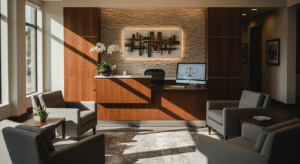
Latest Posts


How to Use an Urban Defense Attorneys Network Directory to Find the Best Defense Lawyer Fast

How to Find a Trusted Local Criminal Law Expert When Every Minute Counts

How to Find the Best Defense Lawyers Fast: A Practical Guide to Using a Premier Defense Law Firm Directory

How to Find the Highest Rated Criminal Lawyers Nearby: A Practical Local Guide

How to Find Top Rated Local Law Firms Criminal Cases in Chicago, IL — A Practical Guide

When to Seek an Experienced Criminal Justice Lawyer Consultation: A Practical Guide for Chicago Residents

How a Professional Criminal Attorney Network Platform Helps You Find Real Defense FastWhen you’re searching for a professional criminal attorney network platform, you want a fast, reliable way to find qualified defense counsel who understands local courts and your rights. I’ve spent years helping people navigate these choices, and I also watch trusted sources like the U.S. Department of Justice for trends that change how cases move through the system — which is why I recommend checking guidance from the Justice Department when you’re researching options: U.S. Department of Justice. Why an attorney network platform matters now Times change, and so does the way people connect with lawyers. A professional criminal attorney network platform brings together vetted defense attorneys in one place so you don’t have to start from scratch. Instead of sifting through dozens of individual firm sites, a network platform shows who is available, their areas of experience, and how they handle cases similar to yours. That speed and clarity matter most when charges are time-sensitive and decisions need to be made quickly. How these platforms work in plain terms Think of a network platform as a marketplace for criminal defense—but not the messy kind. Good platforms verify credentials, confirm court experience, and often offer short bios, client reviews, and initial consultation scheduling. They let you compare attorneys across the same standards: experience with DUI, domestic charges, drug cases, white-collar matters, juvenile defense, or appeals. The best ones also make local connections so you can find someone who regularly appears before the same judges and prosecutors handling your case. Typical features you’ll see on a quality platform Verified attorney profiles with practice areas and years of experience. Filter tools for location, price range, and case type. Secure messaging and appointment booking for quick contact. Transparent client reviews and case results summaries. Top benefits of using a professional criminal attorney network platform Using a network platform can reduce guesswork and help you act faster. Platforms often offer: Access to attorneys who know local courts, judges, and prosecutors. Faster matching to counsel who accept new clients immediately. Clear comparisons so you can make informed choices without legal jargon. Better odds of reaching a lawyer before critical deadlines like arraignment or bail hearings. Choosing the right attorney through the network When you review attorney options, I recommend focusing on three practical factors: specific experience, local courtroom presence, and communication style. Specific experience means they’ve handled your exact charge before, not just criminal law in general. Local courtroom presence matters because attorneys familiar with the local system can often negotiate better outcomes or predict how a judge will react to certain motions. Communication style is essential because you’ll want plain answers and a clear plan. Questions to ask during a first consultation Bring these to your call or meeting so you get the facts you need to decide: How many similar cases have you handled in this county or court? What outcome do you think is realistic, and what role will you play? How will you bill me, and what costs should I expect beyond fees? Who on your team will work on my case and how will we stay in touch? Costs, transparency, and what to expect One common worry is cost. Network platforms help by listing whether an attorney takes flat fees, hourly rates, or payment plans. Look for clear fee explanations and an engagement letter that outlines services so you won’t be surprised later. Some platforms also include free or low-cost consultation options, which can be a good way to compare approaches without committing immediately. What a platform can do for people in the city and nearby neighborhoods Whether you live near the downtown courthouses, in close-in neighborhoods, or farther out in the suburbs, a network platform narrows your search to attorneys who regularly practice in your area. That local focus matters because local attorneys know typical pretrial processes, diversion programs, community resources, and judge tendencies. If you prefer in-person meetings, the platform can flag attorneys with offices near public transit or major streets; if you want remote meetings, the platform can show who offers secure video consultations. Trending topics shaping how networks operate Two trends are reshaping criminal defense work and how networks serve clients right now. First, remote and hybrid court appearances have become far more common. Courts have kept some virtual options after pandemic-era changes, which means attorneys and clients can prepare and appear without losing time on travel. Second, technology such as AI-assisted legal research is speeding up case preparation, allowing attorneys to identify key issues faster. These tools don’t replace judgment, but they let defense teams focus more time on strategy and client communication. Local and national data to think about National agencies track crime and court trends that affect how quickly cases move and how prosecutors prioritize charges. The Bureau of Justice Statistics and other federal agencies report on case processing, incarceration rates, and community supervision trends that influence plea offers and diversion programs. These data help attorneys and clients set realistic expectations during negotiations and plan for the best outcomes. Practical steps to take right now if you face criminal charges If you or a loved one is charged, act deliberately and use the network platform to shorten the timeline. Here are four steps that will help right away: Contact a network platform and request attorneys who handle your specific charge and local court. Prioritize attorneys with verifiable courtroom experience in the same jurisdiction. Schedule an immediate consultation and ask about timelines, likely outcomes, and next steps for protecting your rights. Keep records of arrest reports, citations, and any communications. Share them with your attorney securely through the platform or by secure email. Follow legal advice on bail, hearings, and evidence preservation. Avoid making public statements about the case on social media. How platforms help with emergencies and tight deadlines In criminal matters, timing can be everything. Platforms that specialize in criminal defense often maintain a roster of attorneys who can respond quickly for arraignments, emergency hearings, and bail motions. They can also recommend local mitigation resources like substance treatment programs or community service options that may help in plea discussions. If the platform has a live intake team, it can speed the handoff so a lawyer is on your case the same day you reach out. Common pain points and how networks solve them People commonly tell me their biggest frustrations are not knowing who to trust, hidden fees, and delays getting a lawyer. A quality attorney network reduces those pain points by vetting attorneys, standardizing fee descriptions, and offering scheduling tools that cut wait times. Platforms that provide client reviews and a transparent history of case outcomes make it easier to choose an attorney who matches your needs and your budget. Privacy, security, and communication preferences When dealing with criminal matters, privacy matters. Good platforms use secure messaging and limit public exposure of sensitive case details. They also allow you to choose how you communicate — phone, secure video, or email — and set realistic expectations for response times. Make sure the platform you use clearly explains how your information is stored and who can access it. What success looks like on a platform Success isn’t always an acquittal; often it’s a favorable outcome that minimizes long-term consequences and protects your future. That might be a reduced charge, enrollment in a diversion program, or a plea that avoids jail time. Platforms that document past case results and show attorney strategies give you better insight into which approach is most likely to help you reach that success. Final thoughts and next steps Finding the right defense counsel quickly can change the course of a criminal case. A professional criminal attorney network platform streamlines the search, connects you with local attorneys who understand the courtroom, and helps you compare options clearly. Use the platform to ask focused questions, check attorney records, and choose someone whose experience and communication style fit your needs. If you act fast and stay organized, you increase your chances of a better outcome. If you’re ready to begin your search and want help connecting to vetted local defense attorneys, visit Best Criminal Justice Attorney for immediate options and appointments.

How to Find Trusted Criminal Defense Representation Attorneys Nearby: A Practical Guide for People Facing ChargesI know how overwhelming it feels the moment you or someone you care about hears the word “charged.” Finding reliable criminal defense representation attorneys nearby can change the course of a case, protect your rights, and ease a lot of uncertainty. If you need background on legal processes or want to confirm a next step, start with general federal guidance at USA.gov to understand court basics and government resources. Why local criminal defense matters more than you might think When you search for local criminal lawyers, you’re not just hiring legal knowledge. You’re hiring someone who knows the judges, the prosecutors, the local court clerks, and the way hearings are scheduled in the city. That local insight often affects plea negotiations, pretrial release terms, and how quickly motions get heard. I’ve seen cases where a lawyer’s relationships and familiarity with local procedures shaved months off a timeline or persuaded a prosecutor to offer a more favorable outcome. What criminal defense representation really covers Criminal defense representation covers more than showing up in court. Good defense attorneys do investigation, evidence review, witness interviews, and legal strategy. They handle everything from arraignments and bail hearings to motions, plea deals, and trials. Common service areas include DUI defense, misdemeanor representation, felony defense, drug charges, domestic violence, and white-collar allegations. When a lawyer says they’ll represent you, that often means they will: Explain the charges and potential penalties in plain language Build a defense plan, including motions and discovery requests Negotiate with prosecutors and, if needed, present your case at trial Advise on collateral consequences like driver’s license issues or immigration impacts Top questions I ask clients when assessing a case I begin every initial consult with a few simple but vital questions so I can quickly gauge the scope of representation and prioritize next steps. This helps me give clear, practical advice even in a short meeting. What exactly happened and when did it happen? Were you arrested or only cited? Were there witnesses or cameras? Have you spoken to law enforcement without an attorney present? Do you have prior convictions or ongoing court dates? Immediate steps to take after an arrest or charge If you or a family member faces criminal charges, immediate choices matter. These are the actions I always recommend first because they protect rights and preserve options. Protect your right to remain silent You should politely decline to answer detailed questions until you have a lawyer present. Anything said can be used in court. Call a defense attorney as soon as you can, and if you’re at a station, ask to speak to counsel before answering additional questions. Document everything Write down what you remember, names of witnesses, vehicle details, and timelines. Those notes can help your attorney spot inconsistencies or leads to follow immediately. Ask about bail and release options Bail practices vary by jurisdiction and by charge. Whether the city uses cash bail, release on recognizance, or supervised release can change the short-term picture a lot. Your lawyer can file for early hearings or alternative release options that reduce time behind bars before trial. How I evaluate and pick a local criminal defense attorney for a client There’s no single “best” lawyer for every case, but there are consistent qualities that matter. When I help people decide, I focus on five practical areas that predict results. Experience with the specific charge type — DUI strategies differ from drug trafficking defenses. Familiarity with local courts and key players — that helps in negotiations and scheduling. Communication style — you need clear answers and frequent updates. Trial readiness — even if you hope for a plea deal, you want someone who will go to trial if needed. Transparent fees — open discussion about costs and billing prevents surprises. Trends changing criminal defense work right now Two trends I watch closely are reshaping how defense attorneys work and how cases move through the system. Bail reform and pretrial services Many jurisdictions are reevaluating cash bail and looking to pretrial services and supervised release instead. That can mean fewer people sitting in jail before trial, but it also changes how attorneys prioritize early motions and release hearings. Defense lawyers now focus even more on quick proof-of-risk or community-ties showings to secure release. Virtual hearings and digital evidence Remote hearings have become more common since recent years, and courts now routinely accept body-worn camera footage, phone records, and social media as evidence. That means defense teams must be comfortable with digital forensics and online hearings, and they must be ready to challenge authentication or chain-of-custody concerns. How to read a criminal attorney’s online profile and reviews Online profiles and client reviews give clues but also require interpretation. Look for specifics in reviews: Did the attorney handle a case similar to yours? Did they explain things clearly? Also check for meaningful outcomes rather than just praise. If a profile lists trial wins, ask for details—what level of offense, what jurisdiction, what strategy worked. Questions to ask during a free consultation Most local criminal lawyers offer a free or low-cost initial consult. Use that time to test knowledge and fit. I suggest asking these direct questions to evaluate competence and approach: How many cases like mine have you handled and what were typical results? Who on your team will handle my case day to day? What defense strategies would you consider for my situation? What are your fees and any additional costs I should expect? Common mistakes people make when looking for representation I’ve seen several avoidable errors come up again and again. Avoid these to protect your case and your wallet. First, don’t choose solely on price. A low fee can mean less preparation or a lawyer passing your case to a junior. Second, don’t delay hiring counsel; early intervention can prevent damaging statements, preserve evidence, and secure better release terms. Third, avoid communicating about the case on social media—posts can become evidence and hurt defenses that rely on motive or alibi. How defense attorneys build a strong case The foundation of a strong defense is investigation. That includes interviewing witnesses, checking surveillance footage, reviewing police body-camera and dash-camera footage, and challenging improper searches or seizure. Defense lawyers also pursue discovery aggressively to get police reports, forensic lab results, and prosecutor notes. When appropriate, we bring in experts—such as forensic analysts or accident reconstructionists—to contest prosecution evidence or to create reasonable doubt for juries. When plea bargains are a good option Plea bargaining is often the fastest route to an acceptable outcome, but it isn’t always in your best interest. I recommend considering a plea when it meaningfully reduces penalties, avoids collateral consequences, or significantly improves your life prospects. Your lawyer should explain long-term consequences like immigration impacts, professional licensing issues, and how a plea affects future background checks. How much does local criminal defense typically cost Fees vary widely depending on charge severity, court complexity, and how much trial work is expected. Misdemeanor cases usually cost less than felonies because they typically need less investigation and fewer hearings. Flat fees are common for certain hearings or pleas, while hourly billing is more typical for complex felony trials. Always ask for a fee agreement in writing that lists what’s included and what might cost extra. How I help clients prepare emotionally and practically Facing criminal charges is stressful. I spend time helping clients manage the practical fallout—work issues, family communications, and court attendance—and provide clear, step-by-step expectations for the legal process. Preparing witnesses, organizing documents, and rehearsing testimony can reduce anxiety and improve outcomes. I also advise on temporary measures such as requesting protective orders when safety is a concern. Local resources and support while a case progresses Your legal case is one part of your life. Local community groups, victim services, and legal aid programs can offer support for housing, counseling, or job concerns while your case moves through the system. For up-to-date national statistics and research about corrections, sentencing, and pretrial trends, see the Bureau of Justice Statistics for comprehensive federal data and reports that often affect state-level policy decisions. Quick checklist: How to act the first 48 hours after an arrest Here’s a simple, practical checklist I give clients to protect rights and preserve evidence in the early stages: Exercise your right to remain silent and request an attorney immediately. Document everything you remember about the incident and collect witness names. Ask for bail or release terms and consult counsel about next steps. Do not delete messages, social media posts, or recordings related to the incident. How to evaluate the cost-benefit of hiring
